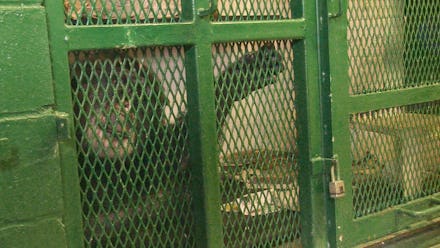Meet the Chimp at the Center of a Historic Legal Battle

Can a chimpanzee be considered a person? In Tommy's case, a New York state court holds the answer.
Tommy is a 26-year-old chimp being held in a cage in a New York warehouse. While that's allowed under animal rights laws, lawyers for the Nonhuman Rights Project say that Tommy's cognitive abilities make him eligible for personhood, meaning he could be considered wrongfully imprisoned.
"Chimpanzees are autonomous, self-determining beings. Why shouldn't they be legal persons?" attorney and Nonhuman Rights Project founder Steven Wise told Wired. "How is it that we can ignore the autonomy of a nonhuman, while making [autonomy] to be a supreme value of a human being?"
The legal argument: The case Wise and others make is that the focus should be on the spirit of the law, that the confinement is inhumane due to Tommy's intelligence and capabilities, rather than the letter of the law, which seems to limit personhood to humans.
Wise called Tommy "the equivalent of a human child" in court, and the project brought in multiple primatologists to account for how smart, social and emotionally complex chimpanzees can be. Those factors go beyond things like simple tool usage: Chimps in the wild are thought to have their own cultures.
It's a tough sell for the courts. A county court already ruled against the notion, though the judge took care to note that Wise's "impassioned representations to the court are quite impressive." As Wired explains, judges generally don't want to radically change things, and designating chimpanzees as people would be a pretty big shake-up.
What it means: Other animal rights advocates seem to think Tommy's issue is just that — animal rights. Dividing lines between nonhumans who count as persons and nonhumans who don't can end up being a messy (and potentially fruitless) affair.
That being said, Wise is still holding out hope that the latest attempt might secure Tommy's release. He says that considering it a simple matter of animal welfare limits our thinking with regard to species.
"Right now, the question is, 'What species are you?' And if you're not human, you continue to be a legal thing, not a person," he told Wired. "We can change that to, 'What sort of being are you? What sort of being is your species? Are you the kind of being who ought to have the potential for any rights at all? And if so, what rights are appropriate for you?"